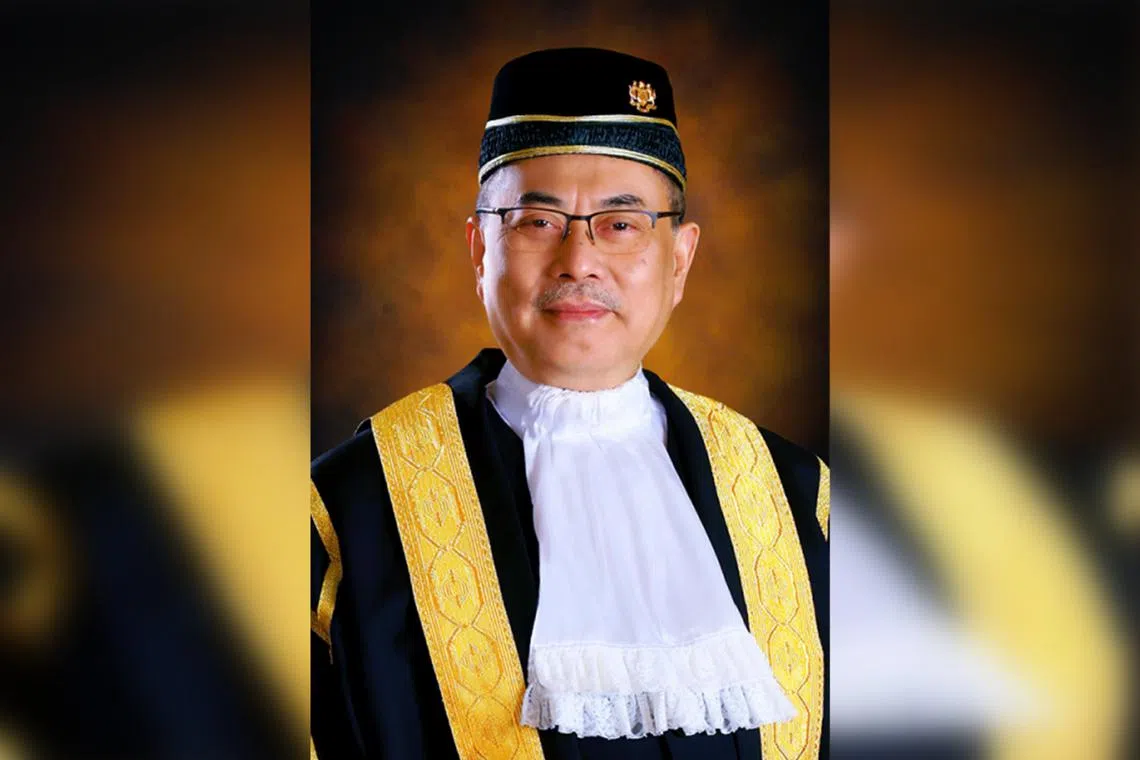News analysis
Appointment of Malaysia’s new chief justice eases controversy over vacant top judge seats for now
Sign up now: Get insights on the biggest stories in Malaysia

Datuk Wan Ahmad Farid Wan Salleh is filling one of several top spots left vacant for weeks in the nation’s highest court following the retirement of several senior judges.
PHOTO: MALAYSIAN JUDICIARY
Follow topic:
- Former deputy minister-turned-judge Wan Ahmad Farid Wan Salleh is Malaysia's new Chief Justice. The much anticipated announcement will help quell controversy over independence of the judiciary.
- Analysts debate if the PM's role in judicial appointments undermines true independence, highlighting the need for the new Chief Justice to uphold judicial integrity.
- Federal Court judge Datuk Abu Bakar Jais is appointed President of the Court of Appeal, while Court of Appeals judge Datuk Azizah Nawawi was promoted to Chief Judge of Sabah and Sarawak.
AI generated
KUALA LUMPUR – Malaysia has appointed former deputy minister-turned-judge Wan Ahmad Farid Wan Salleh as its new chief justice,
The announcement, made in a statement issued by the Office of the Chief Registrar of the Federal Court, said the King, Sultan Ibrahim Iskandar, had approved the appointment on the advice of Prime Minister Anwar Ibrahim and after consulting with the Conference of Rulers.
The appointment of Justice Wan Ahmad Farid, confirming an earlier report in The Straits Times,
Analysts say that while the confirmation, which came in the wee hours of July 18, will ease controversy that has been brewing over the post, meaningful reform to restore confidence in the judiciary can be achieved only if the prime minister is no longer part of the selection process for the top Bench.
Datuk Wan Ahmad Farid, 62, is filling one of several top spots left vacant for weeks in the nation’s highest court following the retirement of several senior judges. Federal Court judge Abu Bakar Jais, 63, was also named as president of the Court of Appeal, while Court of Appeals judge Azizah Nawawi, 63, was promoted to chief judge of Sabah and Sarawak, according to the statement.
Prior to the announcement, 31 judicial positions across various courts remained vacant.
Their official swearing-in and presentation of the appointment letters will take place on July 28 at Istana Negara, before the King.
The announcement of a new chief justice follows weeks of controversy and heightened scrutiny over the delay in naming a successor to former chief justice Tengku Maimun Tuan Mat, who retired on July 2.
The country’s highly regarded first female chief justice, who was lauded by peers and the legal community for her integrity and defence of judicial independence, was not given a six-month extension after reaching the mandatory retirement age of 66 – which had been granted in the past to other retiring judges. Currently, Chief Judge of Malaya Hasnah Mohammed Hashim, who is due to retire in November, is Acting Chief Justice.
Critics, including civil society groups and the Malaysian Bar, had urged transparency and adherence to constitutional processes amid fears of executive overreach, including speculation that Datuk Seri Anwar was manoeuvring to have his pick of Federal Court judge Terrirudin Salleh, 57, fast-tracked for the top job of chief justice. Tan Sri Terrirudin was appointed directly to the apex court in 2024 while he was still serving as Mr Anwar’s attorney-general.
Commenting on the appointments, Mr Anwar said these showed that he had not interfered in the nation’s judiciary. He blamed the delay in naming the appointees on the lengthy appointment process.
“The complaints and grievances that were hurled at me for weeks, the criticisms, the slander, but now, it turns out that those claims were completely off the mark,” he told reporters on July 18, after Friday prayers at a Putrajaya mosque.
“There were names being thrown around... including a former attorney-general who served with distinction and is now a Federal Court judge.
“However, because he still has many years ahead of him, his name was never proposed in the first place. His name was not brought up by me, nor was it discussed by the Conference of Rulers,” he was quoted as saying by the Malay Mail news site.
Part of the speculation surrounding Mr Terrirudin was fuelled by the leak of classified minutes from a May meeting of the Judicial Appointments Commission (JAC) – the body that recommends top judiciary posts to the prime minister – which suggested alleged attempts at interference in judicial decisions.
But Mr Anwar said: “What crisis is there? I did not expel any judges, and I did not refer any judges to the tribunal. I did not interfere in any decisions, nor did I give any judges orders, unlike previous administrations.”
He added, according to The Star newspaper: “This is because the independence of the judiciary must be upheld.”
The Malaysian Bar led a protest march on July 14, where hundreds of lawyers took to the streets to voice their concerns over the delay in appointing the top judges, and called for independence of the judiciary.
Asked to comment on the appointments, Professor Azmi Hassan, a geostrategist and senior fellow at the Nusantara Academy for Strategic Research, told ST: “The appointment of Datuk Wan Ahmad Farid will quell or dispel the notion that Prime Minister Anwar Ibrahim has a hand in picking the chief justice.
“It will restore confidence in our legal system that he does not influence the appointment.”
However, not all observers see the new appointments as a full restoration of judicial independence.
“This does not really restore trust in the judiciary unless they remove the prime minister from the JAC process. That is the only way to restore confidence,” said Asian studies professor James Chin of the University of Tasmania.
Under Malaysia’s appointment process, the JAC recommends candidates for the judicial bench.
The JAC consists of nine members. Four of them have automatic membership due to their senior posts as judges: the chief justice, president of the Court of Appeal, the chief judge of Malaya, and the chief judge of Sabah and Sarawak. The prime minister has the power to appoint the other five members, who must include a Federal Court judge, and four eminent legal individuals not tied to the executive or other public service.
Thus, the prime minister is seen as having a majority vote on the picks by the JAC. Another key point is that the premier will take into consideration, but not necessarily heed, the JAC’s proposed choice of a top judge or judges.
He would then submit the name or names for the top post or posts to the Malaysian King, who would act on his advice after consulting with the Conference of Rulers, consisting of the nine Malay hereditary rulers and four appointed heads of states.
Prof Chin said the appointments, as announced, were “the best outcome for the present circumstances”, adding that the real test of judicial independence under the new chief justice will come when politically sensitive cases are brought before the courts.
Mr Wan Ahmad Farid is currently a judge of the Court of Appeal – the second-highest court after the Federal Court – and also served as deputy home minister under former premier Abdullah Badawi.
He was called to the Malaysian Bar in 1987 and practised law in Kuala Lumpur and his home state of Terengganu. He holds the rare distinction of having served in all three branches of government.
He entered politics in the early 2000s, was appointed a senator in 2005, and served as deputy home minister in 2008. After retiring from politics in 2013, he joined the judiciary as a judicial commissioner in 2015 and later served as a High Court judge from 2019 to 2024.
In 2024, in a move seen as bolstering public accountability in a long-contentious case, the judge ordered the reopening of an investigation into the 2009 death of Mr Teoh Beng Hock, a political aide to an opposition leader, who died after hours of questioning at the Malaysian Anti-Corruption Commission office.
In 2022, Mr Wan Ahmad Farid recused himself from hearing an application by jailed former premier Najib Razak due to his previous affiliation as an Umno politician, as well as having a family member still active in the party. He said that should he continue to hear the matter, it could compromise the integrity of the judiciary.
The Malaysian Bar on July 18 welcomed his appointment, describing it as a relief after months of uncertainty and speculation. It highlighted his 2022 recusal in the Najib case as a reflection of his commitment to judicial independence.
The Bar, in its statement, recalled his remarks at the time that “the public perception of the independence of the judiciary should not be put in doubt. It is not a matter of trial and error”, and that “an independent judiciary is a precious gift to any society. Once it is lost, anarchy reigns”.
“These statements demonstrate a profound understanding of the judiciary’s sacred role in upholding the rule of law,” said Malaysian Bar president Mohamad Ezri Abdul Wahab.
He said the Bar hoped that under the new judicial leadership, the courts would continue to uphold the highest standards of independence, integrity and service.
It also called for other judicial vacancies to be filled “promptly and transparently” to strengthen the administration of justice and restore public confidence in the legal system.
In a joint statement on July 18, nine MPs from Mr Anwar’s Parti Keadilan Rakyat (PKR), including his former deputy president Rafizi Ramli, welcomed the appointments but stressed that they alone were not enough to restore public confidence in the judiciary.
They said the naming of Mr Wan Ahmad Farid as chief justice had somewhat eased public concern, but noted mixed reactions due to his background as a former Umno politician and the perception that he is less senior than some other judges.
“We hope Datuk Wan Ahmad Farid receives these views constructively and sees them as motivation to prove that his leadership will strengthen judicial independence and surpass the outstanding record of Tun Tengku Maimun,” they said.
The nine PKR lawmakers urged the new judicial leadership to quickly fill the outstanding vacancies across the courts to avoid disruptions in the administration of justice.


